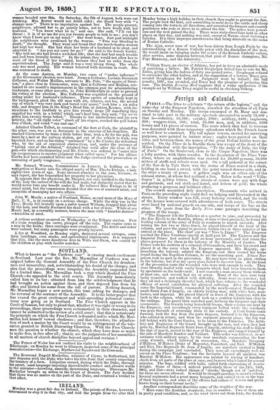SCOTLAND.
What is known as "the Cardross case" is causing much excitement in Scotland. Last year the Rev. Mr. Macmillan of Cardross was ar- raigned before the General Assembly of the Free Church for drunken- ness and immorality, and, notwithstanding his denial of the charges, and plea that the proceedings were irregular, the Assembly suspended him for a limited time. Mr. Macmillan took a step which shocked the Free Church—he appealed to the civil courts. The Assembly immediately called him to its bar ; obtained from him the ackifowledgment that he had brought an action against them, and then deposed him from his office and blotted his name from the roll of pastors. Nothing daunted, Mr. Macmillan began a new action, this time asking for damages, and the reversal of the sentence of the Assembly. It is the latter prayer that has caused the great excitement and wide-spreading polemical contro- versy now going on in Scotland. The Free Church appears in the Court of Session, but only to plead that, whether it was right or wrong in its proceedings, these proceedings were ecclesiastical in their character, and cannot be submitted to the review of a civil court ; that this is notoriously the principle on which the Free Church is founded and to which Mr. Mac- millan had himself vowed obedience ; and that, therefore, the adjudica- tion of such a matter by the Court would be an infringement of the tole- ration granted to British Dissenting Churches. With the Free Church- men the question is whether the church, which they have done so much to make free, is free after all ; that is, are the judgments of her assemblies in all matters of church discipline beyond appeal and revision ?
The Prince of Wales has not 3oniined his visits to the neighbourhood of Edinburgh : on Monday he went to Glasgow, inspected some of the principal manufactories—the Exchange, Blythswood Square and the Crescents.
The Reverend Dugald blackener, minister of Clyne, in Sutherland, fell into disputes with the Duke who takes his title from that county respecting the tenancy of a farm. Litigation ensued, during which the Duke, through his agent, used language imputing discreditable conduct and abusive words to the minister—brawling, assaults, threatening language. Thereupon Mr. Mackellar brought an action in the Court of Session. The Jury decided that there was no malice on the part of the Duke, and returned a verdict to that effect.


























 Previous page
Previous page